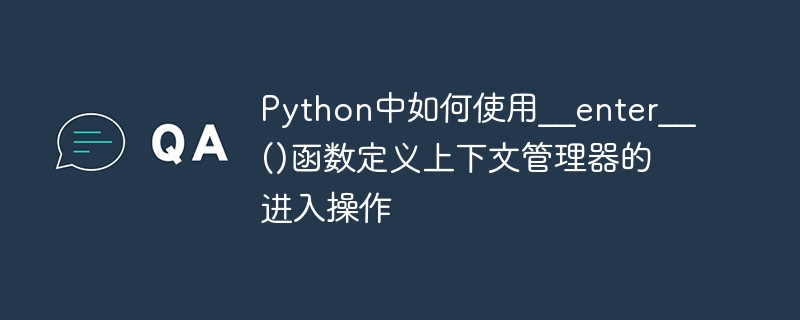

How to use the __enter__() function in Python to define the entry operation of the context manager
The context manager is a mechanism for managing resources in Python. It can ensure that resources are obtained before entering the code block and released after exiting the code block, which can effectively avoid resource leaks and errors. In Python, we can use the __enter__() function to define the entry operation of the context manager. It is one of the special methods in Python.
The __enter__() function is a magic method. When we use the with statement to enter the code block, the __enter__() function will be automatically called and its return value will be assigned to the variable after the as keyword. The following is a simple example:
class MyContextManager:
def __enter__(self):
print("进入代码块")
# 执行进入操作,获取资源
return self
def __exit__(self, exc_type, exc_val, exc_tb):
print("退出代码块")
# 执行退出操作,释放资源
with MyContextManager() as obj:
# 在进入代码块之前执行的代码
print("执行代码块")
# 在退出代码块之后执行的代码In the above example, we defined a class named MyContextManager, which implements the two methods __enter__() and __exit__(). In the __enter__() method, we printed the "entering code block" information and returned the self object. The self here can be any type of object, which determines the value of the variable after the as keyword in the with statement. In the __exit__() method, we print the "exit code block" information, indicating that the code block has been executed.
By using the with statement, we can ensure that the __enter__() method is called to obtain resources before entering the code block, and the __exit__() method is called to release the resources after exiting the code block. The advantage of this is that even if an exception occurs in the code block, the resource can be released correctly.
In addition to the above examples, we can also use the context manager to handle the management of other resources such as database connections, file operations, thread locks, etc. Here is an example of using a context manager to handle file operations:
class FileHandler:
def __init__(self, filename):
self.filename = filename
def __enter__(self):
self.file = open(self.filename, 'w')
return self.file
def __exit__(self, exc_type, exc_val, exc_tb):
self.file.close()
with FileHandler('example.txt') as file:
file.write('Hello, World!')In this example, we define a context manager named FileHandler that passes the file name as a parameter. In the __enter__() method, we use the open function to open the file and return the file object. In the __exit__() method, we close the file using the close() method.
In short, in Python, we can use the __enter__() function to define the entry operation of the context manager, ensuring that resources are acquired before entering the code block and released after exiting the code block. By using the with statement, we can easily manage resources and avoid resource leaks and errors. I hope this article helps you understand the use of context managers in Python.
The above is the detailed content of How to use the __enter__() function in Python to define the entry operation of the context manager. For more information, please follow other related articles on the PHP Chinese website!




